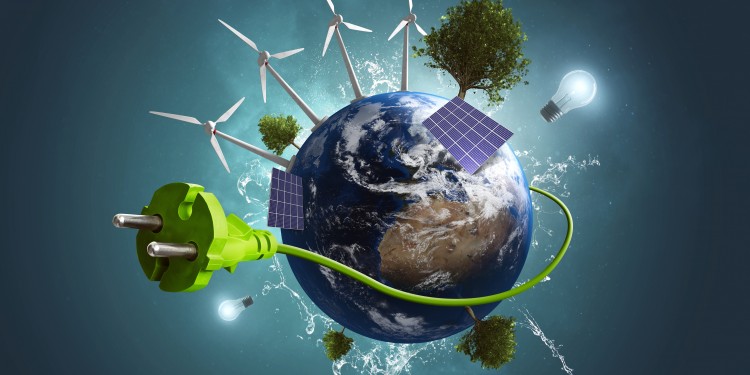
"Bioeconomy has many facets"
A look inside the newspapers is enough to show us that, from climate change to plastic waste, humanity is confronted with enormous ecological crises which have one thing in common: fossil resources such as oil which, directly or indirectly, are contributing to the catastrophes. The reason is that their use as sources of energy releases greenhouse gases such as carbon dioxide, while conventional plastics are also produced from this finite resource. A change in thinking is unavoidable, to which bioeconomy could make an important contribution.
But what is behind the term? “Bioeconomy has many facets, but its fundamental aim is to base economic systems not on fossil-based sources of energy anymore, but on renewable resources,” says Prof. Andreas Löschel, Professor of Microeconomics at Münster University, with a focus on Energy and Resource Economics. The German Ministry of Education and Research (BMBF), for its part, aims to provide information on the challenges and opportunities which bioeconomy offers and has dedicated Science Year 2020 to the issue.
How, then, can such a wide-ranging transformation be designed? “The most important task, as I see it, involves recycling management, in which products are manufactured from renewable resources and are later biodegradable, if they cannot be recycled directly,” says Prof. Bodo Philipp from the Institute of Molecular Microbiology at Münster University. “This also includes the production of biogas from waste products which accrue anyway.” Bodo Philipp’s own research deals with a further bioeconomic approach: microbial waste disposal. “This is a process which uses microbes for reducing pharmaceutical residues in waste water,” Philipp adds. “We’re still at the very beginning, though, and a lot more research will need to be done.”
The development of promising technologies for the future, however, is just one hurdle on the path towards a bioeconomy. There is often a lack of acceptance in society, too, because the targeted use of biological helpers requires customised microbes – genetic engineering, in other words. “Some genetically modified micro-organisms are already being used in the production of so-called platform chemicals, as a basic material for other products,” says Philipp. “It’s different in the production of biogas and the decomposition of pollutants, because in this cases microbes might be released.”
So anyone intending to use the potential of bioeconomic processes for new, sustainable processes, and to rely on micro-organisms for this purpose, will probably have to deal with new applications in genetic engineering. A potential framework for this is the BIOCIVIS project, which has been running at Münster University since November and is being funded for three years by the BMBF. In this project, the public, social stakeholders, politicians and companies are all being involved in a dialogue on equal terms.
The interdisciplinary project is being headed not only by Bodo Philipp, but also by Prof. Doris Fuchs, who is Professor of International Relations and Sustainable Development at Münster University, as well as heading the Centre of Interdisciplinary Sustainability Research (ZIN). “Bioeconomy means many different things, and we have to take a differentiated approach,” says Fuchs. “That goes for all of us. There’s just as much to do in research as in the field of politics and in public discussions.” What this means specifically is that researchers prepare scenarios for bioeconomic processes within the BIOCIVIS project which can then be presented to the public in forums, in a neutral way, and subsequently discussed. “We want to find out what people will find acceptable – or unacceptable,” Fuchs adds. “It will also be important to know under what conditions opnions change.”
One central component in the process is to take seriously people’s level of knowledge and their values. “We’re not saying that we know better than society,” Fuchs is quick to point out. “Our concern is to accept and include people’s values so that, ultimately, different positions can be reached.” Which can change, however: public perceptions are dynamic, with acceptance emerging and then disappearing again.
The discussions taking place within the BIOCIVIS project provide important insights which can ease the path towards a bio-based economy – but which can also show up limitations in society. At the same time, this development depends on an appropriate science policy which, in turn, is influenced decisively by public opinion and perceptions. And one thing is clear: “We won’t be able to do without technologies such as bioenergy,” says Andreas Löschel who, as an economist, deals with the markets for forms of fossil energy.”
Replacing oil, gas and coal with bioenergy – especially in combination with carbon capture and storage – as well as with synthetic fuels, will play a key role, as will the cost of change. “The costs of the transition can be drastically reduced if we use all the options available to us,” says Löschel. “However, there are some technological possibilities which have not been used in Germany so far, or for which there is no acceptance, or which are even forbidden.”
Science Year
Since 2000, the German Ministry of Education and Research (BMBF) has been organising the Science Years in collaboration with the “Science in Dialogue” Initiative. The aim is to increase people’s interest in science and promote a dialogue in society on the subject of research. The Science Year 2020 focuses on bioeconomy and is designed to make the first steps towards a biobased economic system tangible. To this end, numerous formats for discussion and public involvement will be supported, concrete projects funded and the exhibition ship ‘MS Wissenschaft’ (‘MS Science’) sent on a tour through Germany and Austria.
Author: Susanne Wedlich
This article was first published in the University newspaper ‘wissen|leben’, N0. 1, 29 January 2020.
